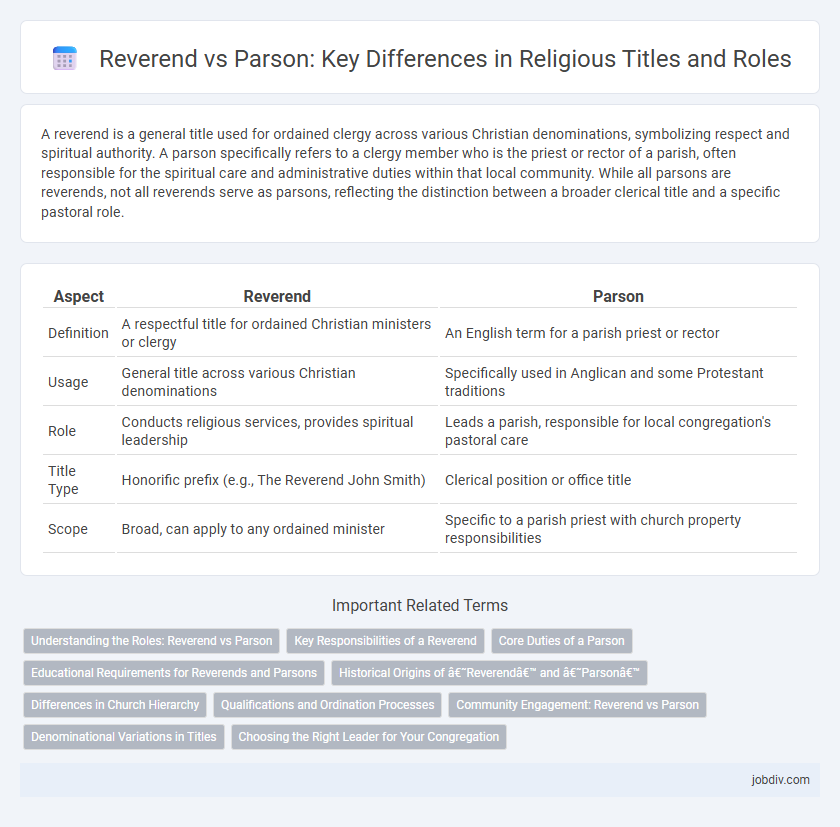A reverend is a general title used for ordained clergy across various Christian denominations, symbolizing respect and spiritual authority. A parson specifically refers to a clergy member who is the priest or rector of a parish, often responsible for the spiritual care and administrative duties within that local community. While all parsons are reverends, not all reverends serve as parsons, reflecting the distinction between a broader clerical title and a specific pastoral role.
Table of Comparison
| Aspect | Reverend | Parson |
|---|---|---|
| Definition | A respectful title for ordained Christian ministers or clergy | An English term for a parish priest or rector |
| Usage | General title across various Christian denominations | Specifically used in Anglican and some Protestant traditions |
| Role | Conducts religious services, provides spiritual leadership | Leads a parish, responsible for local congregation's pastoral care |
| Title Type | Honorific prefix (e.g., The Reverend John Smith) | Clerical position or office title |
| Scope | Broad, can apply to any ordained minister | Specific to a parish priest with church property responsibilities |
Understanding the Roles: Reverend vs Parson
Reverend is an honorific title used broadly for ordained clergy members across various Christian denominations, signifying respect and spiritual authority. Parson specifically refers to a parish priest responsible for the spiritual care and administration of a local congregation, particularly within Anglican and historical contexts. Understanding these roles highlights that "Reverend" denotes a clerical status, while "Parson" emphasizes pastoral duties tied to a designated parish.
Key Responsibilities of a Reverend
Reverends primarily focus on leading worship services, delivering sermons, and providing spiritual guidance to their congregation. They often oversee church administration, perform sacraments such as baptisms and marriages, and engage in pastoral care including counseling and community outreach. Their responsibilities extend to mentoring church members and organizing religious education programs to support faith development.
Core Duties of a Parson
A parson primarily serves as the priest of a parish responsible for leading worship services, administering sacraments such as baptism and communion, and providing spiritual guidance to the congregation. Core duties also include conducting weddings, funerals, and pastoral visits to support parishioners in their daily lives. The role emphasizes community leadership and maintaining the parish's religious and administrative functions.
Educational Requirements for Reverends and Parsons
Reverends typically hold advanced theological degrees such as a Master of Divinity, reflecting extensive formal education and seminary training. Parsons often have similar educational backgrounds but may serve smaller congregations or rural parishes with varying requirements depending on denominational rules. Both positions require ordination, but the scope and duration of their theological education can differ significantly based on church tradition and regional practices.
Historical Origins of ‘Reverend’ and ‘Parson’
The term "Reverend" originated in the early Christian church as an honorific title derived from the Latin "reverendus," meaning "to be revered," and was initially used to denote clergy deserving respect and dignity. "Parson," rooted in the Old French word "persone" and Latin "persona" meaning "person," historically referred to the parish priest entrusted with the spiritual care and administration of a parish during the Middle Ages. These titles reflect their distinct ecclesiastical roles and evolved within the hierarchical structure of Christian churches, emphasizing reverence for clergy and the parson's responsibility to the local congregation.
Differences in Church Hierarchy
Reverends and parsons differ mainly in their roles within church hierarchy; reverend is a general honorific title used for ordained clergy across various Christian denominations, while parson specifically refers to a priest or pastor responsible for a parish in the Anglican tradition. A parson holds a defined ecclesiastical office with duties tied to church administration and pastoral care within a parish, whereas reverend emphasizes clerical status without prescribing specific responsibilities. Understanding these distinctions is essential for grasping church governance and the organizational structure of Christian ministry.
Qualifications and Ordination Processes
Reverends typically hold formal theological degrees such as a Master of Divinity and undergo ordination through established denominational procedures involving rigorous training and examination. Parsons, often associated with the Church of England, must complete specific ordination steps including a curacy period under supervision and approval by a bishop. Both roles require a demonstrated commitment to pastoral care, doctrinal knowledge, and ecclesiastical authority, but the parson's process emphasizes parish leadership within Anglican canonical structures.
Community Engagement: Reverend vs Parson
Reverends often serve as community leaders, actively engaging in social programs and outreach initiatives that foster local support and spiritual growth. Parsons, traditionally seen as parish priests, focus on pastoral care and maintaining church traditions within their assigned parish communities. Both roles emphasize community involvement, but Reverends typically adopt broader engagement strategies beyond the parish boundaries.
Denominational Variations in Titles
Reverend is a broad honorific used across many Christian denominations to address clergy, whereas parson specifically refers to a priest in charge of a parish in Anglican and some Protestant traditions. The title of parson historically denotes pastoral responsibilities tied to a specific church or parish, emphasizing local leadership and community oversight. Different denominations adopt these titles according to their hierarchical structures and theological emphases, reflecting variations in clerical roles and church governance.
Choosing the Right Leader for Your Congregation
Selecting the right leader for your congregation involves understanding the distinct roles of a Reverend and a Parson, as the Reverend often denotes a broader pastoral or denominational authority, while a Parson typically refers to a local church pastor responsible for daily worship and community care. Evaluating the spiritual needs and administrative expectations of your congregation helps determine whether a Reverend's experience in pastoral counseling and church leadership or a Parson's focus on local ministry and direct engagement is more appropriate. Prioritizing qualities like theological education, pastoral skills, and alignment with denominational beliefs ensures the chosen leader effectively nurtures faith and fosters community growth.
Reverend vs Parson Infographic

 jobdiv.com
jobdiv.com